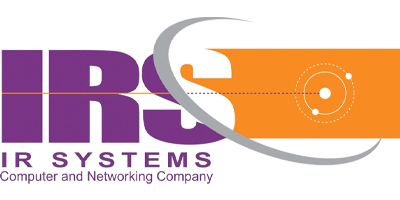Reliable NAS Storage Devices in Pakistan | Synology NAS Solutions
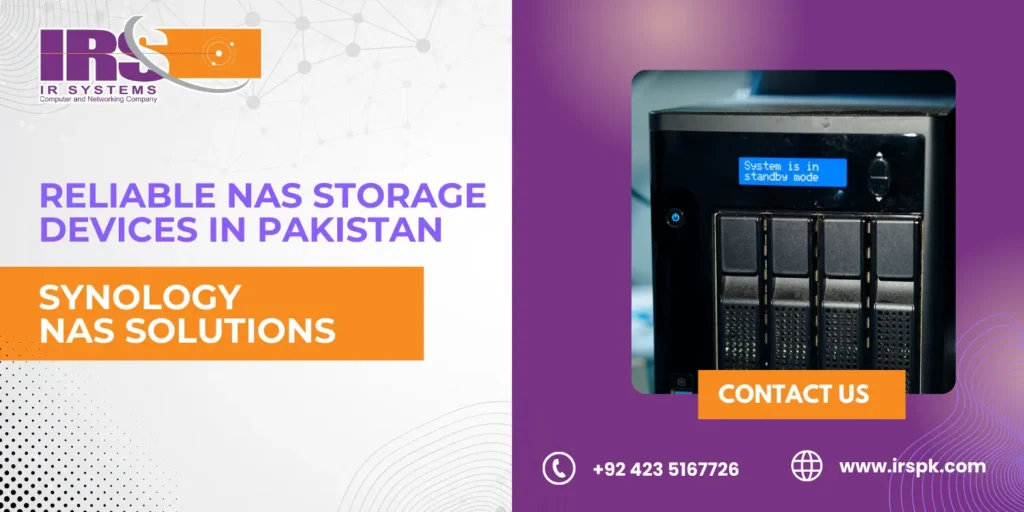
In today’s data-driven world, the need for reliable, secure, and scalable storage has never been more critical. Whether you’re a growing business managing enterprise data or an individual safeguarding personal files, NAS Storage (Network Attached Storage) provides the perfect balance of accessibility and protection. In Pakistan, where businesses are rapidly digitizing and home users are embracing smart data solutions, IR Systems stands as a trusted provider of cutting-edge NAS storage devices in Pakistan, including advanced Synology NAS solutions. In this blog, we’ll explore what NAS storage is, why it’s essential for both individuals and enterprises, how Synology NAS in Pakistan is transforming data management, and why IR Systems is your go-to NAS storage distributor in Lahore and across the country. What is NAS Storage and Why Does It Matter? NAS (Network Attached Storage) is a specialized data storage device connected to your network that allows multiple users and devices to store, access, and share data from a centralized location. Unlike traditional hard drives or USB storage, NAS systems are built for continuous operation, data redundancy, and remote accessibility. Whether you’re managing multimedia content, enterprise backups, or critical documents, NAS ensures your data is always available, organized, and protected. For growing companies and tech-savvy individuals in Pakistan, NAS has become the go-to backup storage device for its reliability, speed, and security. Benefits of NAS Storage Devices NAS storage offers numerous benefits that make it an ideal solution for both businesses and individuals: Centralized Data Management Instead of storing files across different computers, NAS allows you to centralize all data in one location. This simplifies file access, version control, and collaboration within teams. 24/7 Accessibility NAS devices can be accessed from anywhere via the internet, allowing remote teams or individuals to securely access files anytime, anywhere – perfect for hybrid work environments. Enhanced Security With advanced encryption, access control, and user authentication, NAS devices protect sensitive data from unauthorized access. This is a key benefit for organizations handling confidential data. Scalability and Flexibility As your storage needs grow, NAS systems can easily be expanded with additional drives or upgraded capacity – a feature that makes them ideal NAS solutions for enterprises. Automatic Backup and Data Recovery NAS systems are excellent backup appliances. They can automatically back up computers, servers, and even cloud storage accounts, ensuring that your data is safe against accidental deletion or system failures. Cost-Effectiveness Unlike cloud subscriptions that require ongoing fees, a NAS system is a one-time investment that can serve for years, making it a cost-effective long-term storage solution. Why Choose Synology NAS in Pakistan? Among the many NAS brands available, Synology has built a global reputation for reliability, performance, and user-friendly design. As an official Synology NAS distributor in Pakistan, IR Systems provides an extensive range of Synology NAS devices for both home and business users. Here’s what makes Synology NAS stand out: Intuitive Interface (DSM OS): Synology’s DiskStation Manager (DSM) operating system provides a seamless, web-based interface that simplifies data management, sharing, and backup. Comprehensive Data Protection: Built-in backup tools, ransomware protection, and snapshot technology ensure your data remains safe and recoverable. Multifunctional Use: Synology NAS isn’t just storage – it can function as a file server, mail server, surveillance center, multimedia hub, and even a private cloud. Cloud Integration: Seamless sync with Google Drive, Dropbox, and OneDrive makes it easy to unify local and cloud data. Scalable for Enterprises: From small offices to large corporations, Synology offers NAS models with customizable storage, redundancy (RAID), and performance configurations. Whether you’re an individual user seeking a backup storage device or a company needing enterprise-level NAS solutions in Pakistan, Synology provides unmatched versatility and reliability. NAS Storage Solutions for Enterprises in Pakistan For enterprises, data is the backbone of daily operations – from financial records and client information to project files and databases. NAS solutions for enterprises offer a secure and scalable way to handle large volumes of data efficiently. Here’s how NAS benefits enterprises in Pakistan: Efficient Collaboration: Centralized file storage enhances teamwork by allowing departments to share and access files instantly. Data Redundancy: RAID configurations ensure your data remains safe even if one drive fails. Seamless Integration: NAS systems integrate effortlessly with Windows, macOS, and Linux environments, simplifying deployment across diverse networks. Virtualization Support: Many NAS models support VMware, Hyper-V, and Citrix environments – making them ideal for modern IT infrastructures. Secure Backups: Enterprises can back up their local data, servers, and even virtual machines directly to NAS for disaster recovery and compliance purposes. At IR Systems, we specialize in delivering customized NAS storage solutions in Pakistan tailored to enterprise-level needs – combining reliability, speed, and data integrity. IR Systems – Your Trusted NAS Storage Distributor in Lahore, Pakistan As a leading IT solutions provider, IR Systems is proud to be among the most reliable NAS storage distributors in Lahore and across Pakistan. We provide end-to-end support – from selecting the right NAS model to installation, configuration, and ongoing technical support. Here’s why businesses and individuals choose IR Systems: Authorized Synology Partner: Access genuine Synology NAS Pakistan products backed by official warranty and updates. Expert Consultation: Our experienced team helps you choose the ideal NAS setup based on your specific needs – whether personal, business, or enterprise-grade. After-Sales Support: We offer professional assistance for setup, maintenance, and troubleshooting to ensure seamless performance. Competitive Pricing: Get high-quality NAS storage devices at the most competitive market rates in Pakistan. Nationwide Reach: While headquartered in Lahore, we provide NAS storage services and delivery across Pakistan. At IR Systems, we don’t just sell devices – we deliver complete data storage solutions built around your security, scalability, and performance needs. Choosing the Right NAS Storage Device Selecting the right NAS device depends on your storage capacity, performance requirements, and use case. Here are some quick tips: For Home Users: A 2-bay Synology NAS is ideal for personal backups, media streaming, and smart home integration. For Small Businesses: A 4-bay NAS with RAID 5 or 6 provides excellent data redundancy and
Why Asustor NAS is the Best Enterprise Storage Solution
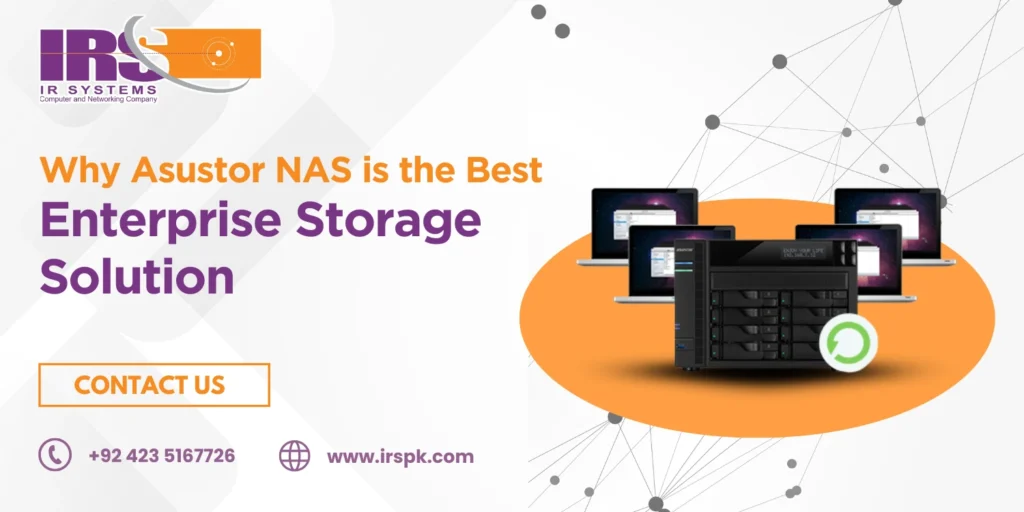
In today’s digital age, data is the backbone of every business. Enterprises need reliable, secure, and scalable solutions to store and manage their growing data. That’s where Asustor NAS storage comes in. Known for its advanced performance, ease of use, and enterprise-ready features, Asustor has quickly become one of the top choices for businesses worldwide. In this blog, we’ll explain why Asustor NAS is the best enterprise storage solution, highlight its benefits for organizations, discuss why companies prefer Asustor in Pakistan, and look at models like the powerful Asustor 6704T. We’ll also touch on related essentials like patch cords, slim flat cables, and 10Gb patch cables that ensure smooth connectivity for enterprises. By the end, you’ll understand why businesses trust Asustor NAS storage and how IR Systems can help you implement it effectively. What Makes Asustor NAS Storage Stand Out? Asustor, a leading brand in the NAS (Network Attached Storage) industry, has earned its reputation for delivering storage solutions that balance performance, reliability, and affordability. Unlike traditional storage devices, Asustor NAS storage offers businesses a centralized way to store, manage, and share data across multiple users and departments. Some standout features include: High scalability – Easy to expand as your data grows. Top-notch security – Advanced encryption and backup features protect business-critical data. User-friendly interface – Even IT teams with limited storage expertise can manage Asustor devices effortlessly. Cross-platform support – Works seamlessly with Windows, macOS, Linux, and mobile platforms. Why Enterprises Choose Asustor NAS Storage Enterprise data needs are complex, and Asustor caters directly to these requirements. Here’s why businesses worldwide and in Pakistan prefer Asustor: Enhanced Data Security For any enterprise, data security is a top priority. Asustor NAS storage comes equipped with multiple layers of defense: AES-256 bit encryption Two-step verification Snapshot technology to prevent ransomware attacks These features ensure your sensitive data is always protected. Seamless Scalability Businesses grow, and so does their data. With Asustor NAS storage, you don’t need to worry about running out of space. Enterprises can add more drives or upgrade models like the Asustor 6704T to meet increasing data demands. High-Speed Performance With enterprise-grade hardware, Asustor NAS storage provides lightning-fast read and write speeds. When paired with 10Gb patch cables and slim flat cables, businesses can ensure smooth, uninterrupted connectivity and data transfers across their networks. Centralized Data Access No matter the size of your organization, Asustor allows teams to access, share, and collaborate on data from anywhere. This centralized approach improves workflow and reduces data silos within enterprises. Why Asustor in Pakistan is Growing in Demand The demand for Asustor in Pakistan is rapidly increasing as businesses recognize the importance of investing in reliable NAS solutions. From SMEs to large enterprises, organizations across industries are turning to Asustor NAS storage for: Cost-effective storage compared to traditional servers. Ease of implementation by local distributors like IR Systems, who provide professional support. Future-proof technology that aligns with Pakistan’s growing digital transformation goals. Whether you’re looking for entry-level NAS devices or advanced models like the Asustor 6704T, the right solutions are now easily available through trusted Asustor NAS distributors in Pakistan. Spotlight on Asustor 6704T – A Powerhouse for Enterprises Among Asustor’s lineup, the Asustor 6704T stands out as one of the best enterprise solutions. Here’s why: 4-bay design – Supports multiple drives for greater storage capacity. 10GbE connectivity – Ensures ultra-fast data transfers. Powerful Intel processor – Handles multiple enterprise tasks with ease. Expandable memory – Ideal for businesses that need scalability. This device is perfect for medium to large enterprises looking for robust performance and reliability. With patch cords and slim flat cables, businesses can easily integrate the Asustor 6704T into their existing IT infrastructure without bottlenecks. The Role of Patch Cords, Slim Flat Cables, and 10Gb Patch Cables While NAS devices are the core of enterprise storage, the supporting accessories play a vital role too. Patch Cords – Ensure strong and reliable connectivity between network devices. Slim Flat Cables – Save space, improve airflow in server racks, and reduce clutter. 10Gb Patch Cables – Unlock the full potential of high-performance NAS devices like the Asustor 6704T, providing ultra-fast transfer speeds. When paired with Asustor NAS storage, these accessories optimize enterprise performance and efficiency. Benefits of Choosing IR Systems for Asustor NAS in Pakistan When it comes to implementing Asustor NAS in Pakistan, choosing the right distributor matters. At IR Systems, we specialize in providing businesses with tailored solutions. Here’s why enterprises trust us: Authorized Asustor distributor in Pakistan Expert consultation for businesses of all sizes Professional installation and support services Access to the latest models like the Asustor 6704T Complete enterprise networking solutions including patch cords, slim flat cables, and 10Gb patch cables We work closely with our clients to design storage setups that meet their exact needs. Why Asustor NAS Storage is the Future of Enterprise Data Enterprises can no longer rely on outdated or fragmented storage solutions. With increasing data loads, cybersecurity threats, and the need for collaboration storage provides the perfect balance of performance, security, and affordability. As businesses continue to digitize operations, solutions like the Asustor 6704T paired with enterprise-grade accessories will ensure smooth scalability and uninterrupted growth. Conclusion Choosing the right storage solution can make or break an enterprise’s efficiency. With Asustor NAS storage, businesses get: Reliable and secure data protection Scalable solutions for future growth High-speed performance with 10Gb support Centralized collaboration and access Whether you’re a growing SME or a large enterprise, Asustor NAS offers the flexibility and power you need. At IR Systems, we’re proud to be a trusted partner for Asustor in Pakistan, helping businesses unlock the full potential of their data. Ready to transform your enterprise storage with Asustor? Contact IR Systems today and let’s build the perfect solution for your business.
Why Should You Switch to vCloudPoint S100A1 Now?

In an era where digital transformation is reshaping every aspect of business, finding the right IT solutions to support growth and efficiency is essential. From schools and small offices to large enterprises, the need for affordable, scalable, and low-maintenance computing systems has never been higher. That’s where the vCloudPoint S100A1 comes in – a cost-effective zero-client solution designed to simplify desktop computing while maximizing performance. At IR Systems, we proudly offer the vCloudPoint S100A1 device as part of our mission to deliver reliable and advanced endpoint computing solutions across Pakistan. Whether you’re managing 10 workstations or 1000, the vCloudPoint S100A1 ensures seamless computing without the overhead of traditional desktop systems. What is vCloudPoint S100A1? The vCloudPoint S100A1 is a compact and energy-efficient zero-client endpoint device that connects to a shared host computer. Instead of running its own operating system or software, it leverages the resources of a central PC or server. This centralized approach drastically reduces hardware costs, simplifies maintenance, and boosts security. Designed with educational institutions, call centers, training labs, and SMEs in mind, the A1 enables multiple users to work independently from a single server, using their own virtual desktop environments. Technical Specs That Matter Let’s break down the hardware behind the vCloudPoint S100A1: Feature Details Model A1 Processor Cortex-A7 Quad-Core RAM 1GB DDR3 Display Output 1× HDMI USB Ports 4× USB 2.0 Networking 10/100 Mbps Ethernet (RJ45) Audio 1× Mic, 1× Speaker Power Consumption Just 5W Dimensions 93×90×18 mm Weight 150g Despite its tiny footprint, this device packs the essentials for everyday computing, making it perfect for light to moderate workloads, such as web browsing, word processing, customer service apps, and learning platforms. Why Businesses Choose vCloudPoint S100A1 Here are some of the most compelling reasons businesses are switching to the vCloudPoint S100A1: Cost-Efficiency Deploying traditional desktops for every user can be expensive. With vCloudPoint S100A1, multiple users share a single host machine, cutting hardware costs by up to 70%. Centralized Management No more running from desk to desk for software updates or maintenance. Everything is handled from the host system, saving time and reducing IT overhead. Energy Saving Consuming just 5 watts of power, the S100A1 dramatically reduces your organization’s electricity usage, supporting green IT initiatives and lowering operational costs. Enhanced Security Because data and applications are stored centrally, there’s minimal risk of data loss or breaches at the endpoint. This makes it a smart choice for organizations with sensitive information. Flexible Deployment The A1 supports various applications – educational labs, call centers, training institutions, public access terminals, and even corporate workstations. How vCloudPoint S100A1 Works with NAS Storage At IR Systems, we believe in building complete ecosystems. While the S100A1 handles the endpoint computing, NAS (Network Attached Storage) devices complement it by offering centralized storage, backup storage device for business, and content access. Here’s how the S100A1 + NAS combination helps you build a smarter IT setup: Central File Storage: All users access files saved on the NAS without duplication. Real-Time Data Access: High-speed NAS systems ensure that files open quickly and save instantly. Data Backup and Recovery: Schedule automatic backups of all workstation data to your NAS device to avoid data loss. Cloud-Like Experience: With the right setup, your local NAS behaves like a private cloud – secure, fast, and cost-efficient. This synergy creates a robust and secure infrastructure with centralized control and distributed computing. Ideal Use Cases for vCloudPoint S100A1 Wondering if this is the right fit for your organization? Here are industries and scenarios where the S100A1 shines: Schools & Colleges Equip computer labs or classrooms without breaking the budget. Teachers and students enjoy independent workstations from one host PC. Call Centers Cut costs on hardware and power while offering each agent a fast, reliable, and secure workspace. Training Centers Deploy dozens of learning terminals quickly and efficiently with centralized content management. Public Access Areas Perfect for libraries, info kiosks, and reception desks where multiple users interact daily. Startups & Small Offices Ideal for businesses looking to expand their workforce without investing heavily in full desktops for every employee. Future-Ready, Scalable IT Infrastructure What makes the vCloudPoint S100A1 truly powerful is its scalability. As your team grows, you don’t need to worry about investing in entire new PCs. Just add another A1 device and connect it to your existing host system. It’s cost-effective, easy to manage, and scalable – everything modern IT should be. And when integrated with NAS storage solutions from IR Systems, you’re not only improving daily operations but also future-proofing your entire digital workspace. Why Choose IR Systems? We’re not just providers – we’re partners in your IT success. At IR Systems, we bring years of expertise in delivering smart storage, computing, and backup solutions across Pakistan. When you choose IR Systems for your vCloudPoint S100A1 deployment, you benefit from: Expert advice tailored to your needs Seamless installation and configuration End-to-end support, including NAS integration Training for your team Long-term support and upgrades We work closely with clients to deliver cost-effective and future-proof setups, whether you’re running a school lab or a growing enterprise. Let’s Build Your Smart Workspace Together Ready to take your computing infrastructure to the next level? Whether you’re looking to save costs, reduce complexity, or scale your operations, the vCloudPoint S100A1 with NAS integration is the perfect solution. Contact IR Systems today for a free consultation and see how we can help you streamline your IT environment with innovative, affordable solutions.
What Is the Best QSAN SAN Storage for Cloud Backups?
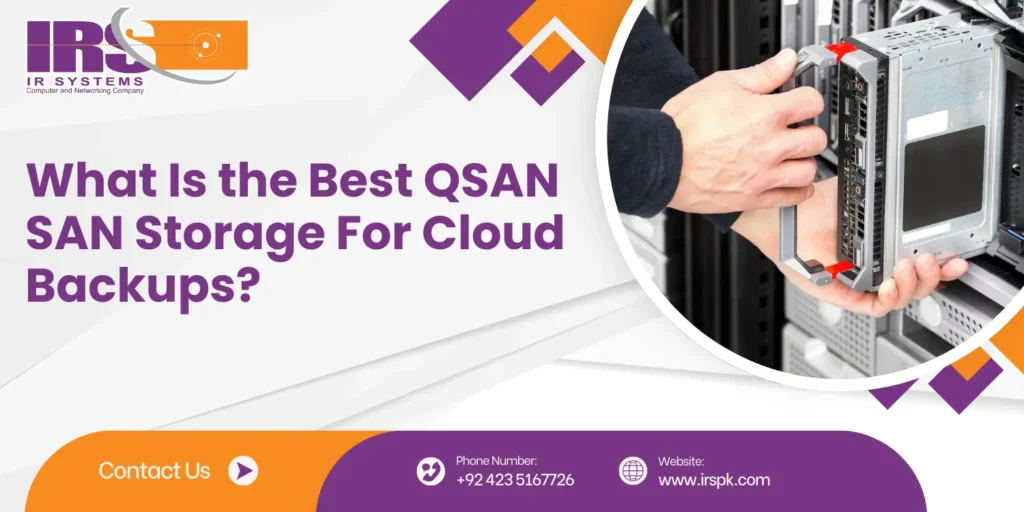
In today’s digital-first world, data is at the heart of every business. Whether you’re a small startup or a growing enterprise, protecting that data with secure, scalable, and high-speed storage is non-negotiable. If your operations rely on cloud backup storage, choosing the right SAN storage system is critical – and that’s where QSAN stands out. At IR Systems, we specialize in building NAS and SAN storage environments that are optimized for performance, data protection, and scalability. In this guide, we’ll explain why QSAN SAN storage is an ideal solution for cloud backups, highlight top-performing models like Qsan XS 5312, Qsan XS 3312, and Qsan XS 3316, and explore how to align your storage infrastructure with your backup strategy. The Importance of SAN Storage in Backup Infrastructure A SAN (Storage Area Network) offers block-level access to data over a high-speed network. This makes it significantly faster and more efficient than traditional external drives or direct-attached storage. When dealing with large datasets or frequent cloud backups, speed, consistency, and uptime are everything – and SAN delivers on all fronts. Why SAN Over Other Storage Types? Block-level storage supports databases, applications, and virtual machines more effectively. Fibre Channel or iSCSI protocols offer high-speed communication. RAID support ensures redundancy and fault tolerance. Easily integrates with backup software and cloud platforms. In short, SAN storage is built for businesses that take their data protection seriously. Where NAS Fits In: A Perfect Complement to SAN While SAN is designed for speed and performance, NAS (Network Attached Storage) is best for file-level access across teams. At IR Systems, we often recommend a hybrid approach that combines QSAN SAN storage with powerful NAS solutions to handle different parts of your business workflow. NAS Storage Benefits: Centralized file access for remote teams Lower cost of entry for basic file sharing Compatible with Windows, macOS, and Linux Excellent for daily backup data storage of documents, media, and reports With the right strategy, your SAN handles mission-critical backups and VMs, while NAS covers collaborative work and light storage. Together, they form a future-ready infrastructure. QSAN: Simplifying Enterprise-Grade Storage QSAN has built a solid reputation for delivering enterprise features without overwhelming complexity or cost. With intuitive interfaces, robust hardware, and reliable firmware, QSAN products are ideal for businesses transitioning to cloud-first environments. Key QSAN Features for Cloud Backups: Snapshot and clone support for point-in-time data recovery Cloud gateway functions for syncing to public clouds (like AWS, Azure) Data deduplication to reduce storage footprint Synchronous and asynchronous replication S.M.A.R.T. monitoring for proactive maintenance Plus, their SAN systems are optimized for integration with backup software like Veeam, Acronis, and Nakivo – which makes deployment faster and easier for your IT team. Detailed Comparison: QSAN SAN Models Ideal for Backups Let’s break down three of the most recommended QSAN SAN models – each suited for different business needs: Qsan XS 5312 – Enterprise SAN Storage at Peak Performance The Qsan XS 5312 is built for businesses that require maximum throughput and always-on availability. It’s ideal for managing large-scale backup data storage or running mission-critical applications on virtual machines. Specs & Highlights: Dual-controller architecture with high availability failover Supports 16Gb Fibre Channel, 10GbE iSCSI, and SAS SSD caching and auto-tiering support for performance tuning Redundant power and cooling systems for uptime 12 x 3.5″/2.5″ bays with expansion options Use Case: Financial institutions, government agencies, healthcare systems – any business with complex data workflows and backup demands. Qsan XS 3312 – Balanced Storage for Mid-Size Businesses The Qsan XS 3312 strikes a perfect balance between performance, affordability, and scalability. It’s an excellent mid-tier SAN solution for businesses looking to centralize backups without overspending. Specs & Highlights: 12-bay chassis with scalable expansion Dual-active controllers with built-in management Supports SSD, SATA, and SAS drives 10GbE support with multi-pathing for faster access Intuitive GUI for simplified backup management Use Case: Digital agencies, law firms, schools, or medium-sized enterprises that need reliable cloud backup storage with high availability. Qsan XS 3316 – Expandable Backup Powerhouse Need more room to grow? The Qsan XS 3316 offers all the benefits of the XS 3312 but with 16 bays instead of 12. This allows more flexibility for growing teams or businesses with heavy backup requirements. Specs & Highlights: 16-bay form factor with seamless scale-out options Compatible with VMware, Citrix, and Hyper-V Built-in data security: snapshot, replication, and WORM support High-speed interfaces for consistent backup performance Use Case: Data centers, media production houses, e-commerce platforms – anyone needing to scale backup operations without system replacement. Real-World Applications of QSAN SAN Storage Let’s take a look at how different industries benefit from QSAN SAN storage: Healthcare: Securely store and back up patient records and imaging files to meet HIPAA compliance. Retail: Centralize transaction logs, product databases, and inventory backups. Education: Keep administrative data, student records, and online learning material safe. Finance: Fast and secure backups for transactional databases and compliance reports. Legal Firms: Archive sensitive documents and ensure safe retrieval with version control. By using SAN storage tailored to these workflows, businesses enjoy faster recovery times, less downtime, and full control over their data lifecycle. Why Partner with IR Systems? At IR Systems, we don’t just sell hardware – we offer end-to-end storage solutions designed around your business. From choosing the right QSAN model to configuring your SAN/NAS network and planning your backup schedule, we’re with you every step of the way. What We Offer: Consultation & Requirement Analysis Custom SAN & NAS Configuration On-site Deployment & RAID Setup Cloud Sync Integration 24/7 Technical Support & Monitoring We’ve worked with companies across Pakistan, helping them secure their digital assets with reliable QSAN SAN storage solutions that scale as they grow. Final Thoughts: Invest in Smart Backup Infrastructure Your business data is too valuable to leave unprotected. By choosing a smart, scalable, and high-performance SAN storage system like those from QSAN, you’re laying the foundation for fast, secure, and efficient cloud backup storage that grows with you. Whether you need the power of the Qsan XS
How SAN Storage Boosts Secure Network Backups
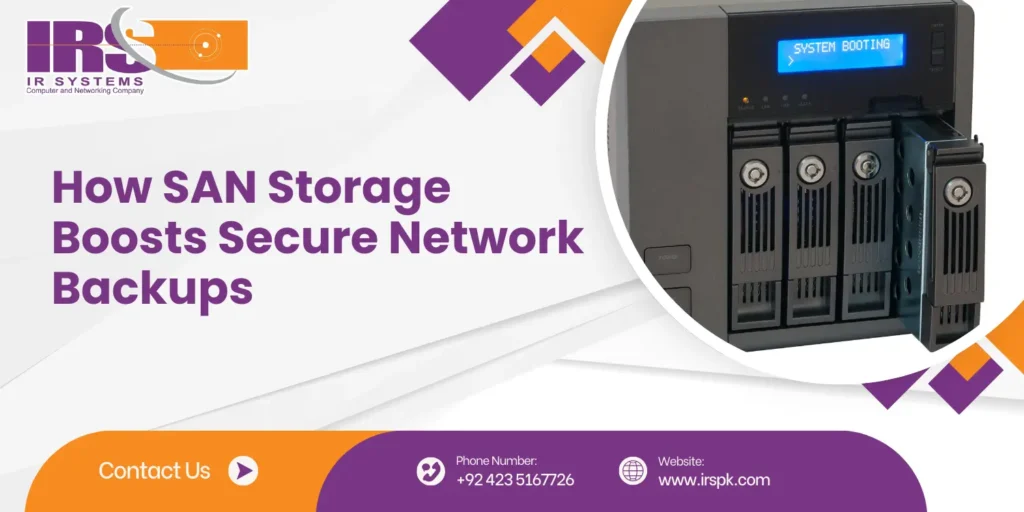
In a world where data fuels every decision and operation, businesses can’t afford to take chances with their backup solutions. Whether you’re running a startup or managing enterprise-level infrastructure, the need for reliable, fast, and secure data backups is undeniable. That’s where SAN Storage steps in as a game-changer. In this blog, we’ll explore how SAN storage not only simplifies backup processes but also enhances network security, performance, and scalability. We’ll also look into how SAN integrates with other storage solutions like Asustor NAS storage systems and supports efficient server cloud backup. Understanding the Basics: What is SAN Storage? SAN stands for Storage Area Network. It is a dedicated high-speed network that connects multiple storage devices to servers, making data available at the block level. Unlike direct-attached storage or basic network-attached storage, SAN storage offers enhanced performance, centralized management, and robust security features. As a key provider in this space, IR Systems specializes in offering tailored SAN storage solutions that empower businesses with dependable and scalable backup options. The Real Value: Why SAN Storage Matters for Backups SAN storage ensures faster, safer, and more reliable backups. It keeps your data centralized, reduces downtime, and gives you full control – making it a smart choice for any secure backup strategy: 1. Enhanced Backup Speeds One of the main challenges in traditional backup systems is the time they take. With SAN storage, data moves through high-speed fiber channels or Ethernet, drastically reducing backup windows. Your business operations won’t have to slow down just because backups are running. 2. Centralized Data Management Managing data across multiple servers can be overwhelming. QSAN centralizes all your storage, allowing you to control backup processes from a single point. This not only saves time but also reduces human errors. 3. Reliable Data Availability With SAN’s redundancy features and high availability, you’re not just backing up your data – you’re ensuring it’s always accessible, even in the face of hardware failures or cyber incidents. Fortifying Backup Security with SAN SAN storage strengthens backup protection by isolating data and preventing unauthorized access, ensuring your critical files stay safe: 1. Isolated Backup Environment SAN storage operates on a separate network, keeping it isolated from the main traffic. This isolation acts as a shield, making it more difficult for cyber attackers to infiltrate backup systems. 2. Advanced Access Controls Many SAN storage area network devices come equipped with role-based access and encryption options. This ensures only authorized users can access or modify backup data, making your backups not just secure but also compliant with data regulations. 3. Faster Disaster Recovery In the event of a disaster, time is critical. SAN storage allows for quick data recovery, helping businesses bounce back faster with minimal losses. Integration with server cloud backup further adds resilience to your disaster recovery strategy. Seamless Integration with Server Cloud Backup Businesses today are increasingly opting for hybrid storage solutions – a mix of on-premise and cloud. SAN storage can work hand-in-hand with server cloud backup, offering both local speed and remote redundancy. Data can be first written to the SAN system for fast access and then mirrored to the cloud for offsite protection. IR Systems offers integration – ready SAN setups that support such dual backup environments effortlessly. How SAN and Asustor NAS Storage Systems Work Together While SAN excels in block-level storage and performance, Asustor NAS storage systems are known for their file-sharing and user-friendly interfaces. Combining the two offers flexibility. Use SAN for performance-critical operations and backups, and NAS for everyday file access and collaboration. This balanced approach ensures data is not only safe but also readily available for your teams. At IR Systems, we help configure systems that blend SAN storage with Asustor NAS devices, creating a powerful and cost-effective storage ecosystem. Designed to Grow: SAN’s Scalability Advantage Every business grows, and so does its data. SAN storage is inherently scalable. You can start with a few terabytes and expand to petabytes without reconfiguring your existing setup. This makes SAN an ideal long-term solution for businesses that are growing or expect to scale their operations. With IR Systems, you get the guidance and hardware support needed to scale your storage efficiently. Why Businesses Trust IR Systems for SAN Storage At IR Systems, we understand that secure data backups are more than just a technical requirement – they’re the backbone of business continuity. Our team specializes in deploying tailored SAN storage solutions that align with your specific needs, whether you’re focused on data protection, disaster recovery, or performance optimization. We not only provide high-performance storage area network devices but also ensure seamless integration with cloud services and NAS systems, offering a complete, secure storage strategy. Final Thoughts: SAN Storage is the Foundation of Secure Backups In an age where data loss can mean financial and reputational damage, having the right storage solution is crucial. SAN storage offers unmatched speed, security, and scalability, making it the preferred choice for modern network backups. By combining SAN with server cloud backup and Asustor NAS storage systems, businesses can build a robust, flexible, and secure data environment. Secure Your Data Today with IR Systems If you’re ready to take your backup strategy to the next level, IR Systems is here to help. Our SAN storage solutions are designed for performance, built for security, and customized for you.Visit IR Systems to get started or contact us today for a free consultation. Let’s build a safer, smarter storage future together.
Reliable NAS Storage for Secure Data Backup
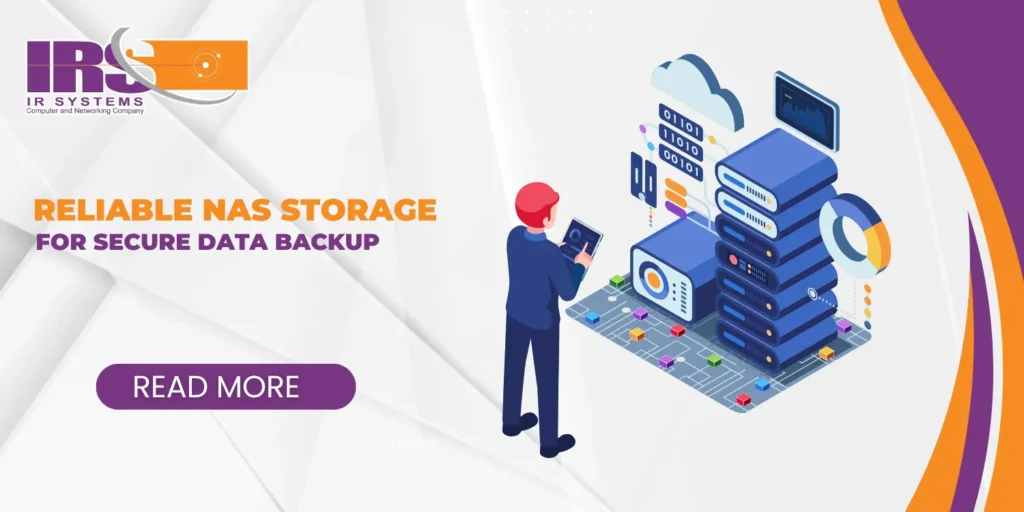
In today’s digital world, businesses and individuals generate vast amounts of data daily. From critical business files to high-resolution media, storing, managing, and accessing data efficiently is essential. Traditional storage solutions such as external hard drives and local servers often fall short in scalability and security. This is where NAS storage (Network Attached Storage) comes into play. NAS storage provides a centralized and efficient way to store, access, and protect your data. Whether you’re running a small business, managing enterprise storage, or looking for a secure backup solution, a network attached storage device can transform your data management strategy. Understanding NAS Storage: What Makes It Different? A network attached storage device is a dedicated file storage system that connects to a network, allowing multiple users and devices to access stored data. Unlike traditional hard drives, NAS offers scalability, high-speed access, and improved security features. How NAS Storage Works Centralized Storage: Data is stored in a single, easily accessible location. Independent Operation: Unlike external hard drives, NAS operates with its own OS and software. Seamless Connectivity: Connected via Ethernet, NAS provides access to multiple users simultaneously. Key Benefits of NAS Storage for Businesses and Individuals 1. Enhanced Data Security and Protection NAS systems include encryption, multi-user authentication, and automated backups to protect against data loss and cyber threats. Many models also offer RAID (Redundant Array of Independent Disks) configurations for redundancy and failover protection. 2. Scalable Storage for Growing Data Needs One of the greatest advantages of network area storage is scalability. Businesses can start with a basic NAS device and expand their storage capacity as needed by adding more drives or upgrading to a higher-tier model. 3. Easy File Sharing and Collaboration For teams working remotely or in an office setting, NAS storage enables smooth file sharing without relying on cloud subscriptions. It provides controlled access, ensuring that only authorized users can retrieve and edit files. 4. Cost-Effective Storage Solution Compared to cloud-based subscriptions or traditional servers, NAS storage offers a one-time investment with no recurring fees. Businesses and individuals benefit from lower long-term costs while maintaining full control over their data. 5. Seamless Integration with Cloud Services Modern NAS storage solutions integrate with server cloud backup providers like Google Drive, Dropbox, and Amazon S3, offering hybrid storage benefits. This ensures data redundancy while allowing users to access their files anytime, anywhere. Choosing the Right NAS Storage Solution When selecting a NAS device, consider the following factors: 1. Storage Capacity Choose a NAS with enough storage to accommodate current and future data growth. Look for models that support RAID configurations for additional protection. 2. Performance and Speed Consider the processor and RAM specifications for fast data processing. Opt for SSD-compatible NAS devices for ultra-fast data retrieval. 3. Security Features Ensure the NAS offers encryption, user access controls, and regular security updates. 4. Backup and Recovery Options Look for NAS models with automated backups, cloud sync, and snapshot technology. 5. Remote Access and Connectivity Some NAS models provide remote access features, allowing users to retrieve files from any location securely. Best Use Cases for NAS Storage Ideal for businesses, creatives, and home users, NAS storage ensures secure file sharing, backups, and media streaming with seamless accessibility. 1. Small Business Data Management A network storage device is perfect for small businesses needing a centralized file system for secure document storage, project collaboration, and efficient backup solutions. 2. Home Office and Personal Backup Freelancers and professionals working from home can benefit from NAS storage to keep personal and work files organized and accessible without relying on external hard drives. 3. Multimedia and Content Creation Photographers, videographers, and designers require large storage capacities for high-resolution files. NAS offers a cost-effective and high-performance solution for storing and editing media. 4. Server Cloud Backup for Enterprises Enterprises with extensive data can use NAS storage to back up servers, providing a reliable disaster recovery solution while ensuring uninterrupted access to critical files. Future Trends in NAS Storage Technology The evolution of NAS storage is moving towards AI-powered management, 5G connectivity, and deeper integration with server cloud backup solutions. Businesses investing in NAS today will be better prepared for the future of data management. Conclusion: Why You Should Invest in NAS Storage Today The importance of NAS storage cannot be overstated. Whether you’re an entrepreneur, a creative professional, or a corporate IT manager, investing in a network attached storage device ensures data security, scalability, and efficiency. If you’re ready to upgrade your storage infrastructure, now is the time to explore the best NAS solutions. Contact us today to find a NAS storage system tailored to your needs and take advantage of its powerful features! Our experts can help you choose the ideal NAS solution, configure it for your specific requirements, and ensure seamless integration with your existing infrastructure. We offer consultation services to assess your data storage needs, recommend the best NAS model, and provide installation and maintenance support. Whether you require a simple home office setup or an enterprise-grade NAS for large-scale data management, we are here to guide you every step of the way. Don’t wait—secure your data with a reliable NAS storage system now!
Why NAS Storage is the Best Choice for Businesses
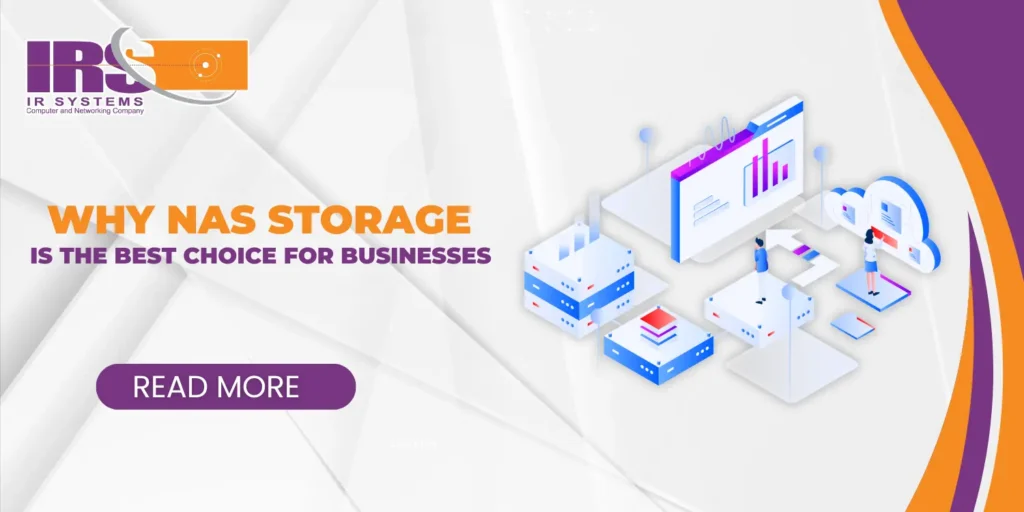
In today’s data-driven world, effective storage solutions are crucial for both businesses and individuals. Whether it’s a small office looking to centralize files or an enterprise managing large datasets, NAS storage (Network Attached Storage) provides a reliable and efficient solution. Unlike traditional storage methods, NAS offers scalability, security, and seamless remote access, making it a preferred choice for modern computing environments. This article explores the fundamentals of NAS devices, their benefits, how they compare to cloud storage servers, and how to choose the right NAS system for your needs. What is NAS Storage? NAS storage is a dedicated file storage system connected to a network, allowing multiple users and devices to access and share files from a centralized location. Unlike direct-attached storage (DAS), which connects storage devices directly to a computer, NAS provides network-based access, enhancing collaboration and data management. Key Features of NAS Storage: Centralized Storage: All data is stored in a single, accessible location. Remote Access: Users can access files from anywhere using a web interface or mobile app. Scalability: Easily add more storage as needed. Automated Backups: Ensures data protection and disaster recovery. Security & Encryption: Protects sensitive files from unauthorized access. Why Choose NAS Storage Over Traditional Methods? NAS storage offers several advantages over external hard drives, USB flash drives, and even some cloud storage servers. Here’s why NAS is becoming an essential storage solution: Higher Efficiency & Performance NAS systems operate independently, meaning they don’t consume computer resources like USB drives do. Cost-Effective Storage Expansion Instead of upgrading multiple hard drives, you can simply expand NAS storage. Enhanced Data Protection Many NAS storage devices come with RAID (Redundant Array of Independent Disks) support, offering redundancy and fault tolerance. Seamless Collaboration Teams can share and access files in real time, improving workflow efficiency. Better Control Over Data Unlike public cloud storage, NAS allows you to have full control over your data without third-party intervention. Understanding NAS Devices When choosing a NAS device, understanding the different types and features is crucial. Here are some factors to consider: 1. Types of NAS Storage Devices Personal/Home NAS: Ideal for individuals needing extra storage and media streaming. Small Business NAS: Supports multiple users with enhanced security and backup options. Enterprise NAS: Designed for large-scale operations with high-speed data transfer and extensive redundancy features. 2. Storage Capacity & Expandability NAS devices typically support multiple hard drives, allowing expansion as storage needs grow. Some high-end models allow up to 16 bays for enterprise use. 3. Performance & Connectivity Gigabit Ethernet & 10GbE support for fast data transfer. SSD Caching for quicker access to frequently used files. Multiple drive bays for redundancy and enhanced performance. 4. Security & Backup Features Built-in firewalls & encryption ensure data security. Automated backups protect against data loss. User authentication & access control allow role-based permissions. NAS vs. Cloud Storage Servers While NAS network-attached storage and cloud storage both offer remote file access, they serve different purposes. Let’s compare them: Feature NAS Storage Cloud Storage Servers Data Control Full ownership Third-party managed Accessibility Local and remote Anywhere with internet Security High (customizable) Dependent on provider Cost One-time hardware cost Recurring subscription fees Performance Faster, localized Slower due to internet dependency When to Choose NAS: When you require faster access speeds without internet dependency. When data security and privacy are a priority. If you prefer a one-time investment rather than ongoing subscription costs. When to Choose Cloud Storage: When you need global access to files without physical hardware. If automatic software updates and maintenance are preferable. When working with external teams who require seamless cloud collaboration. Setting Up a NAS System Setting up a NAS device is straightforward and typically follows these steps: Choose Your NAS Device Select a NAS system based on storage capacity, performance, and budget. Install Hard Drives Insert compatible HDDs or SSDs into the NAS bays. Connect to the Network Use an Ethernet cable to connect the NAS to your router or switch. Access the NAS Interface Use a web browser or mobile app to configure the settings. Create User Accounts & Permissions Set up multiple users and assign access levels based on roles. Enable Data Protection Features Configure RAID, backup settings, and encryption for enhanced security. Best NAS Storage Devices in 2024 Here are some top NAS storage devices to consider for various needs: Synology DS920+ – Ideal for home users and small businesses. QNAP TS-464 – Offers high-speed performance with 10GbE connectivity. Western Digital My Cloud EX2 Ultra – Affordable personal cloud storage. Buffalo TeraStation 3410DN – Great for enterprise-level security and backups. Asustor AS5304T – A solid choice for media enthusiasts and content creators. Future of NAS Storage & Emerging Trends With increasing data needs, NAS storage continues to evolve. Some emerging trends include: Integration with AI & Machine Learning: AI-driven analytics for predictive maintenance and storage optimization. Hybrid Cloud Integration: NAS systems that seamlessly sync with cloud storage servers. NVMe SSD Support: Boosts read/write speeds for demanding applications. 5G & Edge Computing Compatibility: Faster remote access and reduced latency. Final Thoughts: NAS storage is a versatile and cost-effective solution for both personal and business data management. With benefits such as data control, security, scalability, and seamless access, it stands out from traditional storage methods and cloud storage servers. Whether you’re a small business, creative professional, or enterprise user, investing in the right NAS network-attached storage system will improve efficiency and safeguard your critical data. If you’re looking for reliable NAS storage devices, ensure they align with your current and future needs. Explore models with robust security, fast performance, and expandability to get the best value for your investment. Contact us today for expert guidance on choosing the perfect NAS solution for your business or personal use.
QNAP NAS Storage: Top Backup & Network Solution
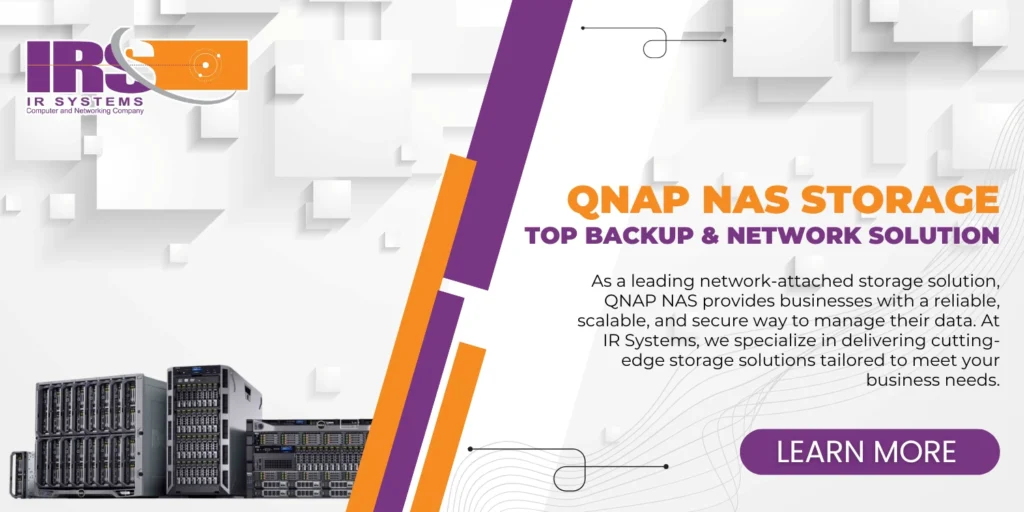
In today’s fast-paced digital world, businesses are generating and managing vast amounts of data daily. Ensuring this data is stored securely and accessible at all times is critical for operational efficiency and business continuity. This is where QNAP NAS Storage comes into play. As a leading network-attached storage solution, QNAP NAS provides businesses with a reliable, scalable, and secure way to manage their data. At IR Systems, we specialize in delivering cutting-edge storage solutions tailored to meet your business needs. In this blog, we’ll explore how this storage can transform your data management strategy, the importance of enterprise data security, and how our solutions can help your business grow continuously. Why Data Security is Crucial for Business Growth Data is the backbone of modern businesses. From customer information to financial records, losing access to critical data can lead to significant downtime and revenue loss. Enterprise data security ensures that your sensitive information is protected from cyber threats, hardware failures, and accidental deletions. With QNAP NAS Storage, businesses can achieve: Enhanced Data Protection: Advanced encryption and RAID configurations safeguard your data. Seamless Backup Solutions: Automated backups ensure your data is always recoverable. Scalable Storage: Easily expand storage capacity as your business grows. At IR Systems, we understand the challenges businesses face and beyond. That’s why we offer tailored backup solutions to help you stay ahead of potential data disasters. The Role of Network Storage in Modern Businesses Network storage, often referred to as Network-Attached Storage solution, is a centralized storage solution that allows multiple users and devices to access data simultaneously. It’s an essential component of any business’s IT infrastructure, providing: Centralized Data Management: Store and manage all your data in one place. Improved Collaboration: Enable teams to access and share files effortlessly. Cost-Effective Scalability: Add storage capacity without overhauling your entire system. QNAP NAS Storage excels in providing these benefits, making it a top choice for businesses looking to optimize their data management processes. How QNAP NAS Storage Enhances Backup Solutions Backup solutions are a critical aspect of any data management strategy. Without reliable backups, businesses risk losing valuable data due to hardware failures, cyber-attacks, or human error. It offers robust backup features, including: Automated Backups: Schedule regular backups to ensure data is always up-to-date. Hybrid Backup Sync: Combine local and cloud backups for added security. Disaster Recovery: Quickly restore data in case of emergencies. For businesses, our backup solutions are designed to provide peace of mind, knowing your data is secure and recoverable at all times. The Essential Guide to Enterprise Data Security and Continuous Business Growth Enterprise data security is more than just safeguarding information—it’s about creating a foundation for uninterrupted business growth. In today’s data-driven world, ensuring your data is secure, accessible, and compliant is critical for long-term success. Here’s how this Storage solution plays a pivotal role in supporting continuous business growth: 1. Data Accessibility: Empowering Your Team With this Storage, your team can access critical data anytime, anywhere. This seamless accessibility enhances productivity, enabling employees to collaborate effectively and make informed decisions without delays. Whether your team is in the office or working remotely, QNAP ensures your data is always within reach. 2. Compliance: Meeting Industry Standards Staying compliant with industry regulations is non-negotiable. This Storage offers advanced security features like encryption, user authentication, and audit logs, helping you meet stringent compliance requirements. This not only protects your business from legal risks but also builds trust with clients and stakeholders. 3. Cost Efficiency: Scalable and Sustainable Solutions Investing in scalable storage solutions like QNAP NAS allows you to reduce IT costs while accommodating growing data needs. Instead of overhauling your entire system, you can expand storage capacity as your business grows, ensuring cost-effective and sustainable operations. By partnering with IR Systems, you gain access to expert guidance and cutting-edge technology tailored to your business needs. Let us help you build a secure, efficient, and growth-oriented data management strategy. FAQs About QNAP NAS Storage What is QNAP NAS Storage? It is a network-attached storage solution that provides secure, scalable, and efficient data management for businesses. How does QNAP NAS ensure data security? QNAP NAS uses advanced encryption, RAID configurations, and automated backups to protect your data from threats and failures. Can QNAP NAS be customized for your business needs? Yes, QNAP NAS is highly customizable, allowing you to scale storage and features as your business grows. Why choose IR Systems for backup solutions in Lahore? We offer tailored solutions, expert support, and cutting-edge technology to ensure your data is always secure and accessible. Why Choose IR Systems for Your Storage Needs? At IR Systems, we are committed to helping businesses and beyond achieve their data management goals. Our expertise in QNAP NAS Storage and backup solutions ensures that your data is secure, accessible, and optimized for performance. Whether you’re looking to enhance data security, streamline operations, or support continuous business growth, we have the solutions you need. Visit us to learn more about how we can help your business thrive. By investing in QNAP NAS Storage and partnering with IR Systems, you’re not just securing your data—you’re paving the way for sustainable business growth. Contact us today and let us help you build a future-proof data management strategy.
Future-Proof Your Business with SAN Storage Solutions

As businesses grow, so does the demand for efficient data storage solutions. Traditional storage methods can no longer meet the increasing need for high performance, scalability, and security. That’s where SAN storage comes in, providing an advanced solution for enterprises to manage large volumes of data while ensuring business continuity with reliable backup solutions. In this article, we’ll explore what this storage is for, how it works, and why it’s a game-changer for businesses. What is SAN Storage? An Overview Storage Area Network (SAN) is a specialized high-speed network that connects storage devices to servers. Unlike direct-attached storage (DAS) or network-attached storage (NAS), SAN storage operates at the block level, offering faster and more efficient access to data. In a SAN setup, multiple storage devices are connected to a central network, allowing servers to access storage as if it were local. This setup enhances data transfer speed and improves overall system performance. Key features of storage include: High Performance: Offers low latency and high-speed data transfer. Scalability: Easily accommodates growing storage needs. Reliability: Provides redundancy and failover mechanisms for data protection. How SAN Storage Works SAN storage works by separating storage resources from the server, creating a dedicated network for data transfer. This network connects servers to storage devices through a fabric layer, typically using Fibre Channel or iSCSI protocols. The fabric layer ensures efficient communication between servers and storage arrays, making data retrieval faster and more reliable. Here’s a breakdown of the process: Storage Devices: These can be hard drives, SSDs, or other storage media. Fabric Layer: The network infrastructure connecting servers and storage devices. Servers: The machines that access and manage data stored on the SAN. By isolating storage traffic from regular network traffic, this storage significantly reduces latency and enhances data access speeds. Why Choose SAN Storage Over Other Solutions? Choosing the right storage solution is crucial for any business aiming to optimize data management. Here’s how SAN storage compares to other options: Feature Direct-Attached Storage (DAS) Network-Attached Storage (NAS) SAN Storage Performance Limited Moderate High Scalability Limited Moderate High Data Protection Basic Advanced Enterprise-grade Backup Solutions Manual Automated Seamless Integration SAN storage stands out due to its high performance, scalability, and built-in data protection features, making it ideal for businesses handling large amounts of critical data. SAN Storage as a Reliable Backup Solution Data loss can be catastrophic for businesses. That’s why having a robust backup solution is essential. It offers advanced backup capabilities, ensuring that your business data remains safe and accessible at all times. Here are some key backup features provided by SAN storage: Snapshot Backups: SAN systems can take frequent snapshots of data, creating point-in-time copies that allow quick recovery in case of data corruption. Data Replication: This storage supports data replication across different locations, ensuring that your data is always backed up in a secure environment. Automated Backups: Automate backup processes to reduce human error and ensure consistent data protection. With these features, businesses can minimize downtime and prevent data loss, ensuring continuous operations. The Role of QASAN Storage in Modern Data Management When discussing SAN storage, it’s essential to mention QSAN storage, a unique variation of SAN technology designed to offer even more robust performance and reliability. QSAN storage integrates advanced features such as: High Availability: Ensures minimal downtime with failover mechanisms. Data Deduplication: Reduces storage needs by eliminating duplicate data. Advanced Security: Protects data against unauthorized access and cyber threats. These features make QSAN storage an ideal choice for organizations looking to optimize their data management strategies. Benefits of Implementing SAN Storage Adopting storage offers numerous advantages for businesses, especially those that rely on large-scale data processing. Here are some key benefits: 1. Enhanced Performance By creating a dedicated network for storage traffic, it minimizes latency and boosts data transfer speeds. This is particularly beneficial for applications that require high I/O performance. 2. Scalability As businesses grow, their data storage needs evolve. This storage allows organizations to add more storage capacity without disrupting existing systems, ensuring seamless scalability. 3. Data Protection With built-in backup solutions, SAN storage ensures that data is always protected. Features like snapshots and data replication provide businesses with peace of mind, knowing that their data is safe. 4. Business Continuity In the event of hardware failure or cyber-attacks, SAN storage ensures quick data recovery, minimizing downtime and maintaining business operations. Choosing the Right SAN Storage Solution When selecting this storage system, businesses should consider their specific needs and future growth plans. Here are some factors to keep in mind: Storage Capacity: Ensure that the solution can handle current and future data volumes. Performance Requirements: Choose a system that meets your performance needs for critical applications. Backup and Recovery Features: Look for advanced backup solutions like automated backups, snapshots, and data replication. Security Measures: Ensure that the system offers robust security features to protect against data breaches. Common Use Cases for SAN Storage This storage is widely used across various industries due to its high performance and reliability. Here are some common use cases: Enterprise Applications: It supports mission-critical applications that require high-speed data access. Virtualization: It enhances performance in virtualized environments by providing fast and reliable storage. Data Backup: Businesses rely on this storage as a primary backup solution to protect their data. Disaster Recovery: With features like data replication, it ensures quick recovery in disaster scenarios. FAQs About SAN Storage What is the difference between SAN storage and NAS storage? It operates at the block level, providing faster and more efficient data access. NAS storage, on the other hand, operates at the file level and is more suitable for file sharing. Can SAN storage be used as a backup solution? Yes, it offers advanced backup features such as snapshots, data replication, and automated backups, making it a reliable backup solution for businesses. What is QSAN storage? QSAN storage is a variation of SAN technology that offers enhanced performance, high availability, and advanced security features. How scalable is SAN storage? This storage is highly scalable,
Efficient NAS Storage Solutions for Business Data
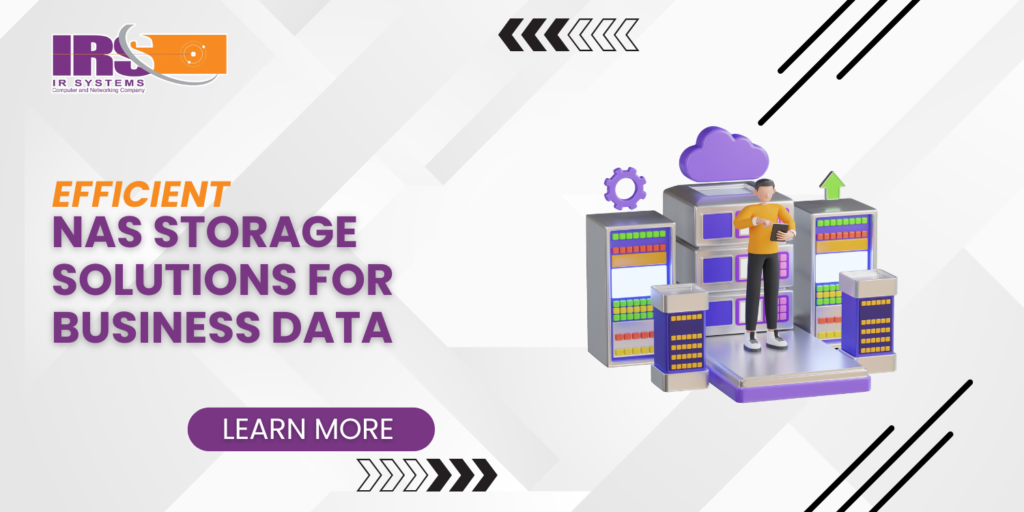
Network-Attached Storage (NAS) solutions provide an efficient way for businesses to store, manage, and access data. Unlike traditional storage solutions, NAS Storage offers a centralized location for storing data, which enables multiple users and devices to access the information they need. With the right NAS system, businesses can enhance data accessibility and optimize backup solutions to improve workflow and minimize downtime. In this article, we’ll cover the benefits of NAS Storage, explore its role in backup solutions, and discuss how it differs from network storage options. Let’s dive into why NAS might be the right solution for your business. Why Choose NAS Storage? NAS Storage brings various benefits, especially for organizations that need reliable and scalable data storage. Here are some of the main advantages: Centralized Data Access: NAS Storage allows you to centralize your data in one location, ensuring easy access for employees across the network. Enhanced Data Security: With NAS solutions, businesses can implement security measures, from user authentication to data encryption. Scalability: NAS devices are designed for flexibility, enabling businesses to add more storage capacity as they grow. Backup Efficiency: Many NAS solutions come with built-in features that support automated and scheduled backups, a significant asset in Backup Solutions. Understanding NAS: How It Works NAS Storage operates as a file-level data storage server connected to a computer network, allowing users to access files easily. This differs from Direct Attached Storage (DAS), where storage is tied to a single computer. NAS Storage is accessed via the network, making it a cost-effective solution for sharing files across multiple devices in an organization. Some key features include: File Sharing and Accessibility: NAS systems enable team members to access and share data seamlessly. Data Synchronization: Synchronize data across devices to ensure everyone in the organization is on the same page. Remote Access: Many NAS solutions offer remote access, which is invaluable for employees working offsite. Backup Solutions: How NAS Enhances Data Protection For companies looking for robust backup solutions, NAS systems offer a dependable option. Here’s how NAS supports efficient backups: Automated Backups: NAS solutions can schedule backups automatically, saving time and reducing human error. Version Control: Many NAS systems allow for versioned backups, meaning you can revert to previous versions of files if needed. Data Recovery: NAS systems often include features that simplify data recovery in case of accidental deletion or system failures. Cloud Integration: Some NAS solutions integrate with cloud services, enabling a hybrid approach to backups for extra security. By utilizing NAS for backup solutions, businesses can ensure their data remains safe, accessible, and up-to-date. For more information on choosing the right NAS system for backups, check out our website or contact our team to help you find the right storage solution for your business. Network Storage vs. NAS Storage: Key Differences While NAS is one form of network storage, it’s essential to understand how it differs from other network-based storage solutions. Here’s a quick comparison: NAS Storage: Primarily focused on file-level storage. Easy to set up and manage within a small or medium business environment. Ideal for businesses needing file sharing and backup capabilities. SAN (Storage Area Network): Provides block-level storage, often used for databases or high-performance applications. Typically more complex and requires a dedicated network infrastructure. Suited for enterprises with high-speed, high-availability requirements. Which to Choose? NAS Storage is often the right choice for businesses seeking an affordable, user-friendly solution for data storage, while SAN might be more appropriate for larger enterprises with complex storage needs. How NAS Storage Supports Business Growth NAS Storage not only enhances current operations but also supports business scalability. Here’s how: Cost-Effective Scaling: As your storage needs grow, NAS allows you to add more drives or even additional NAS units. Improved Collaboration: With centralized storage, employees can collaborate more effectively, accessing shared files without delay. Business Continuity: NAS devices with failover capabilities ensure that your data remains available, even in case of hardware failure. Implementing NAS Storage in Your Business When implementing NAS Storage, consider the following steps to ensure it meets your requirements: Assess Your Storage Needs: Identify your current and future storage demands. Choose the Right NAS Device: Select a device based on capacity, security features, and backup capabilities. Set Up User Permissions: NAS devices often allow you to assign user-specific permissions, keeping sensitive data secure. Establish a Backup Routine: Use the backup features in your NAS to create regular data backups. Benefits of NAS for Small and Medium Businesses NAS Storage offers specific benefits for small and medium-sized businesses (SMBs): Reduced IT Costs: With NAS, there’s no need for complex IT infrastructure, making it a budget-friendly solution. Enhanced Productivity: Teams can access data quickly, improving workflow efficiency. Streamlined Data Management: Managing data across departments becomes easier with a central storage system. For SMBs, the investment in NAS Storage is small compared to the convenience and data accessibility it provides. FAQs Q1. How does NAS Storage differ from cloud storage? A1: NAS Storage stores data on physical hardware within your network, while cloud storage keeps data on remote servers accessed over the internet. NAS offers faster access in-office, while cloud storage enables easy offsite access. Q2. Can NAS Storage help with data recovery? A2: Yes, many NAS systems offer data recovery tools, including version control and redundancy features, helping businesses recover data in case of accidental deletion or hardware failure. Q3. Is NAS Storage scalable? A3: Absolutely. Most NAS devices allow for storage expansion, making it simple to increase capacity as your business grows. Final Thoughts: As data management demands continue to grow, NAS Storage offers an ideal solution for businesses seeking reliability, scalability, and accessibility. With benefits such as centralized data access, robust security features, and backup automation, NAS Storage supports your business’s data needs while simplifying IT management. Whether you’re a small business looking to streamline file sharing or a growing company in need of enhanced backup solutions, NAS Storage is a flexible and cost-effective option. Ready to explore NAS Storage? Visit our website to find the
